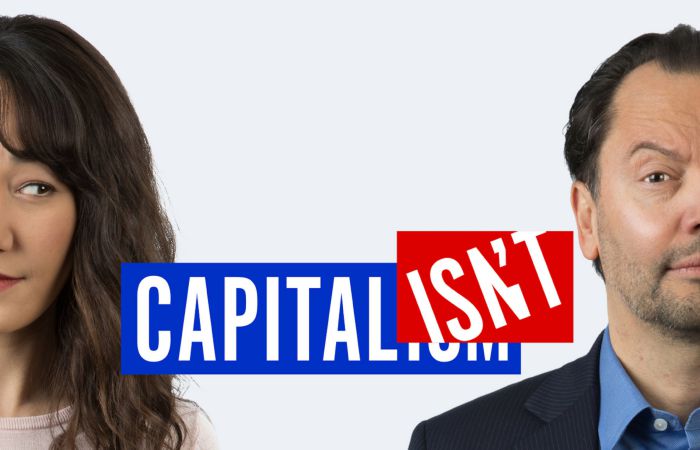Twitter banned political ads from its platform but has full discretion in deciding what constitutes a “political ad.” The Stigler Center tried to promote a tweet announcing a new podcast by Luigi Zingales and Kate Waldock on health care, but Twitter refused to approve it because it allegedly violated its policy regarding political ads. Yes, health care is a topic with political implications, but should we allow digital platforms to silence public debate?

On October 30, Twitter CEO Jack Dorsey announced a ban of political ads on his platform to prevent disinformation campaigns and electoral interference. Seemingly, a bit of good news. But should we allow Twitter to decide what is political advertising and what is political debate protected by the US Constitution?
A few days ago, Luigi Zingales and Kate Waldock released a new episode of their podcast, Capitalisn’t, dedicated to the health care reform debate. Zingales is a professor at the University of Chicago Booth School of Business and one of the editors of this blog, and Waldock is an assistant professor at Georgetown University. After the episode went online, the Stigler Center tried to promote it on Twitter, investing some money to make the tweet more visible on the platform.
This is the tweet we wanted to promote:
You don’t need us to tell you there’s something very wrong with the American healthcare system. The real question is: what can we actually do to fix it? @katewaldock + Luigi @zingales delve into the economics and capitalism of the healthcare debate: https://t.co/QEHtgoYIgo pic.twitter.com/UQFNONnV1s
— Stigler Center (@StiglerCenter) December 5, 2019
Surprisingly, Twitter replied that the tweet “cannot be included in your Twitter Ads campaign” because it does not respect the Twitter Ads policy for “political contents.”
Let’s check those policies to see why a tweet that promotes neither any candidate nor any political party, but a chat between two academics, has been rejected:
“We define political content as content that references a candidate, political party, elected or appointed government official, election, referendum, ballot measure, legislation, regulation, directive, or judicial outcome.
Ads that contain references to political content, including appeals for votes, solicitations of financial support, and advocacy for or against any of the above-listed types of political content, are prohibited under this policy.
We also do not allow ads of any type by candidates, political parties, or elected or appointed government officials.”
The Tweet promoting the new Capitalisn’t episode probably violated the second paragraph. It actually contains “references to political content.” American health care is a hot-button political issue and prominent in the presidential campaign. But is Twitter allowed to silence such a relevant debate just because it has political implications?
Every rule has its exceptions. In this case, the rationale for exceptions is far from clear: “Advertisements promoted by news publishers that meet the following criteria will be exempted.”
This sounds quite surprising. On the one hand, this logic seems obvious: news publishers covering politics should be allowed to promote their tweets because what they’re actually promoting is not a certain candidate or party, but journalistic content.
However, this exemption has the paradoxical effect of maximizing the impact of politically-biased media outlets while independent institutions, think tanks, or advocacy groups will have no chance of having their voices heard in the twittersphere. If President Trump tweets something on China and trade wars, Fox News is allowed to promote a tweet commenting on what Trump said, while independent experts can tweet their opinions but are not allowed to pay to make them more visible.
Here are the criteria that news publishers are supposed to respect if they want to be exempted from Twitter’s political ad ban:
-
The publication’s website has a minimum of 200,000 monthly unique visitors in the United States.
-
Contact information is available online.
-
“About” information is available online.
-
Dedicated reporter/editorial staff information is available online.
-
The publication has a searchable archive available online.
-
The publication is not primarily a user-generated or aggregated content platform.
-
The publication is not dedicated to advocating on a single issue.
It is worth noting that ProMarket does not meet some of these criteria, while online outlets with an explicit political agenda, such as Jacobin on the left and Breitbart on the right, are allowed to sponsor political contents on Twitter.

The result is that ProMarket and Capitalisn’t, two media products of one of the most respected academic institutions in the world, the University of Chicago, cannot promote their truly independent news analysis whose only aim is to improve the quality of political conversation. Outlets with a political agenda and an explicit bias are allowed to do whatever they want, just because they are bigger (and presumably more profitable partners for Twitter).
Mr. Dorsey, could you please explain how such repression of free speech is supposed to help the democratic debate in the United States and protect American voters from propaganda and fake news?
The ProMarket blog is dedicated to discussing how competition tends to be subverted by special interests. The posts represent the opinions of their writers, not necessarily those of the University of Chicago, the Booth School of Business, or its faculty. For more information, please visit ProMarket Blog Policy.






